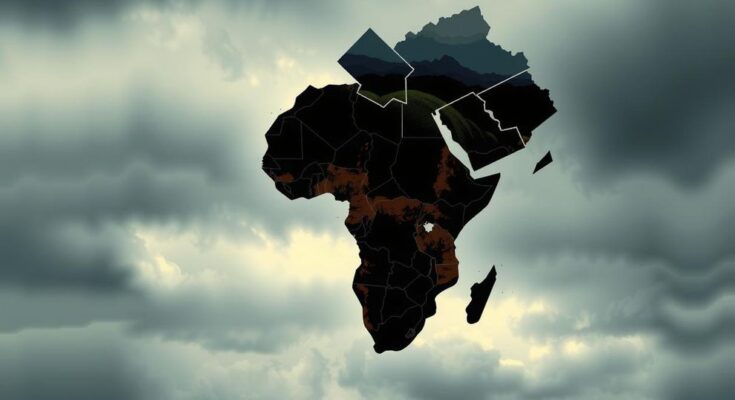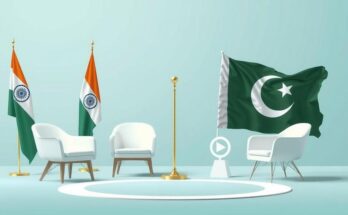The Democratic Republic of the Congo has terminated diplomatic relations with Rwanda due to escalating violence from Rwandan-backed M23 rebels approaching Goma. This conflict has resulted in multiple fatalities among peacekeepers and significant civilian displacement. The situation prompts urgent international attention as Goma’s security is increasingly at risk.
The Democratic Republic of the Congo (DRC) has officially severed diplomatic relations with Rwanda amid escalating combat between government forces and the M23 rebel group, reportedly backed by Rwanda. The hostilities surrounding Goma have resulted in the deaths of at least 13 peacekeepers and foreign soldiers, displacing thousands of residents from their homes. As M23 rebels continue to advance, concerns grow over the security of Goma, a city housing approximately 2 million individuals and serving as a crucial humanitarian center.
The M23 rebel group has gained significant ground along the DRC-Rwanda border in recent weeks, threatening to overrun Goma. Accusations against the Rwandan government persist, with DRC, the United States, and U.N. experts asserting that Rwanda supports M23, a group formed by ethnic Tutsis that splintered from the Congolese army over a decade ago. In contrast, Rwanda denies these allegations but acknowledges maintaining military forces in eastern Congo.
A statement from the Congolese Foreign Ministry declared the immediate severance of diplomatic ties with Rwanda and the withdrawal of all its diplomatic personnel from the country. Amid these developments, the U.N. Security Council expedited an emergency meeting due to the escalated violence, originally arranged for the next day. Ongoing gunfire and the migration of tens of thousands of displaced civilians toward Goma heighten worries about the city’s impending capture by M23.
With heavy fighting reported in recent days, government forces, bolstered by U.N. troops and units from the Southern African Development Community, have managed to repel M23’s advances. The DRC military reported that clashes resulted in casualties among both peacekeepers and soldiers, including losses on both South African and Uruguayan contingents. The deteriorating security situation raises alarms regarding the humanitarian crisis developing in the mineral-rich eastern DRC.
Since 2021, DRC’s armed forces, aided by allied forces such as MONUSCO, have endeavored to prevent the M23 rebels from encroaching further into Goma. This U.N. peacekeeping mission, operational for over two decades, encompasses around 14,000 personnel working to stabilize the region amidst ongoing conflict.
The conflict in eastern Congo is rooted in decades of political instability, ethnic tensions, and competition for valuable mineral resources. Various armed groups, including M23, have emerged over the years, often with external support, further complicating the humanitarian situation in the region. The M23’s resurgence and accusations of Rwandan involvement underline the fragile security environment surrounding Goma, which is vital for humanitarian efforts and regional stability. The presence of multiple armed groups has made the area one of the most complex conflict zones in the world, affecting millions of lives.
In summary, the Democratic Republic of the Congo’s decision to cut diplomatic ties with Rwanda amid intensified rebel attacks highlights the increasing instability in the region. The humanitarian crisis exacerbated by the ongoing violence continues to displace large populations. With international scrutiny rising and U.N. forces engaged, the situation remains precarious as Goma’s security hangs in the balance.
Original Source: apnews.com




